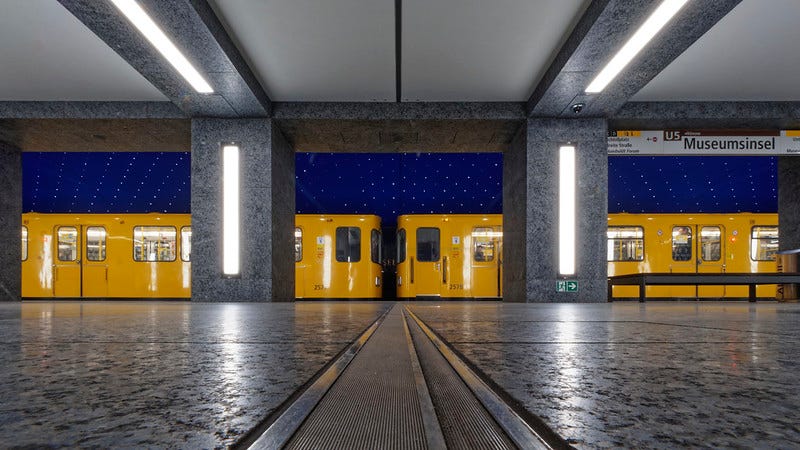#55: Ukraine, AfD, bad cops, BER
Plus: Nebenkosten!! and a longish read about Berlin's washing bears (raccoons).
Dear 20 Percent,
Another twist in this horrific, strange war: last night we learned that former chancellor Gerhard Schröder (SPD), Vladimir Putin’s closest German friend, met with the Russian president in Moscow on Thursday to somehow persuade him to stop his assault on Ukraine. “Either he’ll leave the Kremlin with his pay packet or a Nobel Peace Prize,” people quipped on Twitter. Schröder’s wife, Soyeon Schröder-Kim, who travelled with him, was ridiculed for posting on Instagram a selfie of herself praying with Saint Basil’s Cathedral on Red Square visible in the background. Schröder has been under fire for refusing to quit his positions on the boards of Russian fossil fuel companies. The entire staff of his (taxpayer funded) personal office resigned last week out of protest.
Two weeks into the war, Germany has been hugely affected on so many levels, from the sudden, gigantic increase in defense spending to the fact that an estimated 1,000 Germans have left to fight on the Ukrainian side.
Germany is sending more than just arms to Ukraine. Today a Deutsche Bahn cargo train left Berlin for the besieged country carrying 350 tonnes of emergency provisions, including diapers, baby food, medicine and drinking water.
In Berlin itself, there have been isolated xenophobic attacks on Russian and Ukrainian people and institutions, but perhaps the most visible sign of the war is the influx of up to 15,000 people per day arriving in the capital by car, train or bus.
Normal Berliners are volunteering at the Hauptbahnhof or ZOB bus station and donating massive amounts of food and supplies as the city-state scrambles to set up welcome centres and temporary housing. Social affairs minister Katja Kipping (Linke) said sites have been found for at least 8,000 people from Köpenick to Kreuzberg, from Weißensee to Tegel, where terminals A & B of the former airport (which already did a stint as a vaccination centre) have been turned into an “arrival and distribution centre for refugees” as well as accommodations for 2,500 to 3,000 people. In a side note, the Ordnungsämter have been instructed to waive parking fees for cars with Ukrainian license plates. Even more revolutionary for Germany: the toilets at Hauptbahnhof have been made free-of-charge.
Here’s our page listing ways that you can help in this massive unfolding crisis
More news below!
Maurice
The Berlin corona stats for Friday, March 11
Fully vaccinated: 76.7% (76.6% Tuesday)
Received booster: 58.7% (58.5% Tuesday)
New cases in one day: 4,274 (5,575 Tuesday)
Total deaths: 4,298 (+21 over Tuesday)
🔴 7-day Covid-19 incidence (cases per 100,000): 725.5 (853.1 Tuesday)
🔴 7-day hospitalization incidence (also per 100,000): 14.5 (14.5 Tuesday)
🟡 Covid-19 ICU patient occupancy: 11.4% (11.1% Tuesday)
Source: Berlin’s corona page
AfD can be put under surveillance
It’s not local news per se but surely of interest to our readers: A court in Cologne has ruled that the far-right Alternative für Deutschland (AfD) party can be categorised as “a suspected case of right-wing extremism”. This means that the domestic intelligence agency, the Federal Office for the Protection of the Constitution, is officially allowed to monitor the party using methods such as tapping into its communications and employing undercover informants. Unsurprisingly, the AfD says it will be challenging the court decision.
Bad cop crackdown
Some 64 disciplinary proceedings are currently ongoing against Berlin police officers suspected of “politically motivated misconduct while on duty”, broadcaster RBB reported. Most of these involve racist comments or behaviour. In 2021, the Berlin police’s anti-discrimination office (LADS) received 51 complaints, 41 of which were related to racism accusations against the police. Back in 2020, a racist chat group with 26 Berlin police cadets was discovered and the city’s force has been under pressure to do more to combat discrimination.
Warning: Nebenkosten are skyrocketing
Regardless of whether you rent or own, it’s probably a good idea to set aside some cash for that most annoying of all letters from your landlord (or the Hausverwaltung) - the Nebenkostenabrechnung. Nearly everyone who lives in an apartment pays a set monthly contribution for gas and/or heating oil (as well as trash, maintenance and a handful of other necessities). The figure is set based on previous use and prices. Once actual use can be measured through the bizarre practice of you needing to be home to let a stranger traipse through your house (technology is eliminating this questionable ritual), your landlord/Hausverwaltung either refunds some of the contribution or comes with hands out, demanding you offset the difference. The bills traditionally come in the fall — nine months after the end of the last year — and the bills for 2021 are going to be difficult and 2022, in the fall of 2023, terrifying (gas was 32.2 percent and heating oil 51.9 percent higher in January than a year earlier, according to Focus, because of the sanctions against Russia as well as general inflation). Start saving now (or work on getting a raise) and thanks to reader Rob for reminding us to remind you.
Cleaner U-Bahn stations?

BVG is hiring 66 people to work as U-Bahn station caretakers who will work shifts to ensure Ordnung at the city’s most problematic metro stops, Berliner Zeitung reports. The new teams will begin work in the summer, with priority given to the U8 between Gesundbrunnen and Hermannplatz — which everyone knows is the dodgiest stretch in the city. Maybe just hire the young men already hanging out down there?
BER Terminal 2
A year and a half after BER opened (almost a decade late), the airport's second terminal, T2, will begin operation on March 24, RBB reports. It's designed to handle 6 million passengers a year. Ryanair will be the new terminal's main user, so you’ll probably be able to procure Irish lottery tickets and over-priced, bland food in the terminal while leaving any semblance of self-esteem at security. But BER is helping the Ryanair experience begin before takeoff: After passing through T2 security, passengers will cross over to T1 because T2 doesn't have any of its own gates. Ryanair probably investigating how to charge you for that. The airport says air travel is recovering, with 953,000 travellers passing through BER in February, six times as many as during the same month in 2021.
Support 20 Percent Berlin with a small monthly amount on Patreon
Longish read: The raccoons of Berlin
The number of raccoons in Berlin has exploded in past years, according to Derk Ehlert, Berlin's wildlife officer, with most sightings in Köpenick, Spandau, and Reinickendorf. Ehlert reckons anywhere between 1,000 and 5,000 now live in the city, but with no hunters and plenty of food about, their population could grow much bigger. Their German name is nearly as cute as the animals themselves - — Waschbären, or washing bears.
Haven’t seen one? Neither have I, but apparently the key to spotting these midnight trash pandas is to look up. As one Prenzlauer Berg resident, Melanie S., tells us: “I once saw one sleeping in a tree outside my window on the 4th floor.”
Originally from North America, there are two breeds of raccoon in Germany – a white-furred species released into the forests of West Germany in the 1930s by a ranger who claimed he wanted to “enrich the fauna” but, according to Ehlert, just wanted “more things to shoot and eat”, and a black-furred species around Berlin that was released from a fur farm in 1945.
While not a threat to you and me, they’ll happily raid gardens, take over attics, and are a menace to local wildlife, causing declines in local bird populations from eating their eggs. But if you dispose of a raccoon, another will likely take its place. So, unlike other Bundesländer, Berlin only shoots them if they are sick, or posing a threat. This means only a disease, or a cold winter, would see numbers dwindle.
So, what do you do if you do see one? Well, according to Ehlert: “Don't feed them. Let them live. Take the photo. Enjoy the moment, but please don't take them home. They’re wild.” - by Anna Fleck
👇 Check out our sponsor 👇
See what you can afford to buy in Berlin
The rise of Berlin as a startup capital has brought with it several externalities, one of them being a scarcity of apartments for both renting and living. With no end in sight, low interest rates make buying in Germany's capital still relatively affordable compared to other capitals around Europe. But interest rates may not stay low forever: use Hypofriend to check whether buying makes sense. Hypofriend is an online home buying platform with dedicated English-speaking mortgage brokers to help you find and finance your dream home.
Calculate what you can afford to buy.
Need to promote your business? Why not advertise on 20 Percent Berlin?





